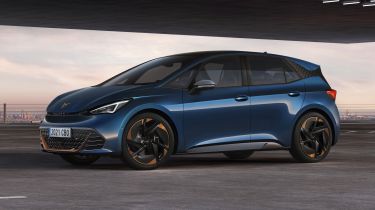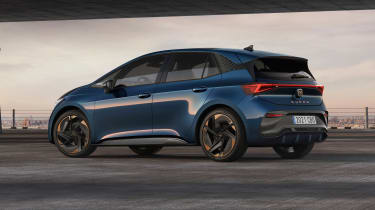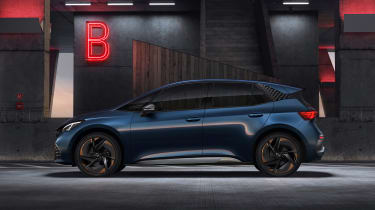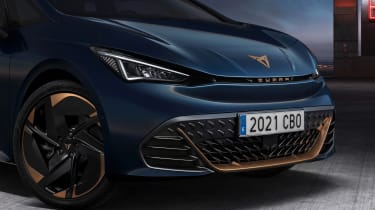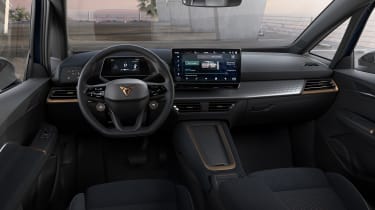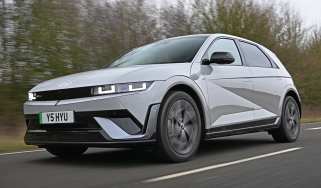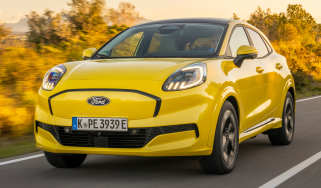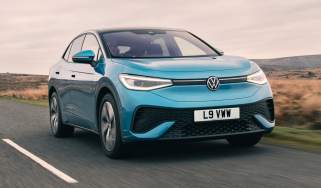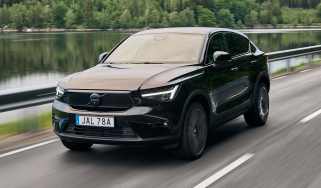New Cupra Born: line-up broadened with faster e-Boost versions
The electric Cupra Born is now on sale; prices start at £34,715
- Born gets sporty styling and interior with copper detailing
- Largest 77kWh battery gives range of up to 335 miles
- PCP finance from £399 per month
New Cupra Born e-Boost models have now joined the line-up. These are slightly more powerful versions, which cut the 0-62mph time by around half a second and give the Born an even sportier bent than the Volkswagen ID.3 on which it’s based.
The Born is one of the first sporty electric cars on the market and is part of Cupra’s expanding electrification plans. Rivals will include the Nissan Leaf and Tesla Model 3, but to date, there aren’t many EVs with a truly sporty focus.
2022 Cupra Born UK prices and specs
The Cupra Born range starts at £34,715, meaning the car doesn’t qualify for the reduced plug-in car grant (PICG). Three trim levels are available, with the entry-level V1 offering plenty of equipment.
 The 10 best electric cars in 2025
The 10 best electric cars in 2025
A Cupra Born V1 features parking sensors and a rear-view camera, adaptive cruise control, a heated steering wheel, keyless go, ambient lighting, rain-sensing wipers and LED headlights. The V2, costing around £2,000 more, adds heated front seats, tinted rear windows and an augmented reality head-up display. Top-spec V3 gets massaging and electrically adjustable front seats and is priced from £38,390. Each model gets a different size and design of alloy wheels, ranging from 18 to 20 inches in diameter.
The Cupra Born e-Boost versions are available on both 58kWh and 77kWh battery options, but it’s not offered on the cheapest V1 trim. Prices for the Born e-Boost start from £37,445 – around £800 more than the standard 58kWh option. The 77kWh versions cost from £40,215 (V2) and £41,975 (V3).
For the standard 58kWh battery option in V2 specification, Cupra’s PCP finance deal stands at £399 per month for four years after a £7,338 deposit.
Performance, range and charging
The Cupra Born is based on the MEB platform, which also underpins the Volkswagen ID.3 hatchback - the two cars also share the same powertrains, though the VW isn’t currently offered with e-Boost. Every version of the Cupra is rear-wheel drive, although four-wheel-drive models are expected to be offered later.
Born buyers can spec a powerful 201bhp electric motor with the 58kWh battery capable of up to 260 miles. It offers strong performance, going from 0-62mph in 7.3 seconds. The e-Boost model has the ability to temporarily increase power to 228bhp, reducing the 0-62mph time to 6.6 seconds. At the top of the range, the 77kWh battery model comes with e-Boost as standard and manages 0-62mph in seven seconds with a range of up to 335 miles.
The 77kWh battery supports 135kW DC rapid charging, meaning a charge from 0-80% takes around 35 minutes.
Handling
Cupra promises the Born will offer a sportier driving experience than the ID.3 on which it's based, in keeping with the brand’s performance focus. This is thanks to a low-mounted battery, giving the car a near-perfect 50:50 weight distribution for balanced and secure handling.
Buyers will be able to choose adaptive suspension as an option. This adds four driving modes called Range, Comfort, Individual and Cupra. Speed-sensitive power steering is also fitted, along with a traction control system designed to maximise traction in all weather conditions.
Styling
The production version of the Born is largely unchanged from the SEAT el-Born concept, which was first shown at the 2019 Geneva Motor Show. The front of the car remains short with a sharply angled bonnet leading to a slim front grille featuring a bronze ‘CUPRA’ logo and standard LED headlights. Beneath this sits a trio of air intakes divided by a copper coloured trim section. The sides of the car feature copper and black finished alloy wheels, along with black contrasting inserts in the lower sills and rear quarter panel.
At the rear of the car, a full-width LED light bar is fitted, along with a copper Cupra badge and logo. Beneath this, the rear bumper features a black contrasting insert and a colour-matched rear diffuser.
Interior, technology and practicality
The interior of the Born features a standalone digital dial cluster along with side-mounted drive-mode selector. It also gets a flat-bottomed sports steering wheel with a pair of copper-trimmed mode selection switches.
There are copper accents and stitching throughout the interior, including on the air vents, door handles and centre console. A pair of sports seats are fitted, which feature copper-themed inserts. A 12-inch infotainment screen is standard, and incorporates touch-sensitive sliders for both the stereo volume and ventilation controls.
Buyers can pick from two leather-free upholstery options, called Dinamica and Seaqual Yarn. The Dinamica trim is available in either dark blue or grey, and is made from a mix of recycled clothing and single-use plastics. The Seaqual Yarn trim is also eco-conscious, manufactured from upcycled marine plastics received from beaches, rivers and the ocean.
An array of safety technology is fitted, including predictive active cruise control, traffic sign recognition and Travel Assist, which can assist with the car’s acceleration, braking and steering on a motorway. Optional safety features include a 360-degree camera and parking assist. A side and exit assist system is also available, which monitors blind spots and approaching traffic, sounding an audible warning if a hazard is detected.
While the Born’s side profile looks to be largely similar to the ID.3 at a glance, the car is actually around 100mm longer and 30mm lower than the VW, meaning it should maximise interior space. Practicality should also be good, thanks in part to the 385-litre boot, which is slightly larger than that of a SEAT Leon.
Read about the cars coming in 2022 and beyond.
Recommended
Most Popular

New Smart #5 Brabus is a 637bhp far cry from the brand’s city car past

Best car leasing deals 2025: this week’s top PCH offers
Tips & advice

Car dashboard warning lights: what does each symbol mean?

Electric car charging stations: public networks, charger types, apps and maps


